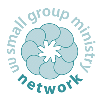The session plans for group meetings call all of us to intimacy, learning how to be together, and ultimacy, going deeper in topics of life and witness. These session plans have been created by clergy and laity, from congregations of all sizes, varied geographic and demographic settings, and settings within and outside of congregations. Small Group Ministry provides the process for deepening our listening from the heart, learning from the experiences of others, and sharing because we all contribute to the faith community. Our divergent world views both complement and clash. We learn to set aside our own views in order to engage in and receive new insights, and we hone the ability to share in such a way that others can hear what we have to offer.
Let's start considering the Small Group Ministry (by whatever name locally) session plans as a form of Unitarian Universalist literature that is accessible and usable, continually being written, and being shared. And by their very use, ever influencing Unitarian Universalist thought. Consider these notes, and add your thoughts.
How many Small Group Ministry/Covenant Group session plans are there?
Over eight hundred in the UU Small Group Ministry website session plan directory, with more sessions for posting sent in continuously. There are several hundred more in the session plan collections that are linked from the website. Numerous session plans that have been created locally and not shared yet. So, how many? We estimate several thousand.
Who writes these session plans? The origin of a session plan should be noted, including the congregation and an individual. This includes writings of parts that are created for a session plan by people in the local setting. We need to acknowledge the contributions to UU thought and spirituality. Several hundred people have been involved in writing session plans, as noted on sessions that have been sent for inclusion on the Network website. There are many more who have contributed. This may be a team of writers in a congregation. Also, small groups themselves develop session plans. Writers include people who have been life-long UUs, and those who are newly exposed to UUism.
Ministers have frequently been authors of such session plans, writing on their own or with lay congregants. This was particularly true in the early development of Small Group Ministry. Ministers publish collections of meditations and sermons. Will published session plans be the next type of published collection - for ministers and laity? Some congregations have compilations of session plans for distribution and sale.
It is exciting to see session plans that are noted as being based on a session plan written by another person. That is sharing and networking. We need to include original authors, just as we would like to be acknowledged.
Why are session plans written? There may be a story behind a session plan or a specific reason for writing it. Sometimes notes accompany the plans that are sent in for inclusion on this website. These show that the session plans develop from our experiences, literally, or engaging with a topic that impacts our lives. These notes also may provide nice historical reference for congregational life.
Is the format the same for all writers and congregations?
Basics: are delineated in Basic Elements and Implementing Small Group Ministry, (http://www.smallgroupministry.net/basicelements.html)
Session plans include local preference. Some session plans are written to be used spontaneously; others have pre-session readings or questions for reflection. Groups have various ways of interacting to allow openness without interference. Some groups have the check-in/sharing before the opening words, though most use the opening words to move into the sharing. The variations can be seen by looking at a variety of sessions on the Network website (http://www.smallgroupministry.net/public/sessions/index.html)
Benefits to writers
Developing a session plan with a broad introduction to the topic and questions that open into new visions is a creative act. It allows participation from all levels and corners of the community and denomination.
Considerable thought and intention are required to present an idea so that another person can connect with it. You write the session without knowing the result. This is precisely the difference between a session plan and a lecture. Set the stage but not the result. Invariably I find that perceptions and ideas that I never would have imagined emerge from what I have written. Small group ministry sessions encourage a sense of openness and adventure.
What topics are included?
We are continually trying to organize the sessions for ready accessibility. Some of the broad categories are:
Life and life issues
Spiritual journey, beliefs
Community relations and life, covenanting
Social Justice, witness
SGM group practices and dynamics
Celebrations
These are always changing as we write for a new time and focus.
What are your thoughts about Session Plans as a form of UU Literature? If you are attending General Assembly June 20-24, 2018, Kansas City, MO, share them at the UU SGM Network Booth #114 or send them for publication in Covenant Group News. cgneditor@smallgroupministry.net







